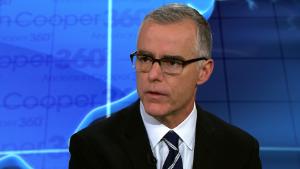McCabe: 'I think it's possible' Trump is a Russian asset
Former acting FBI Director Andrew McCabe said Tuesday it is possible President Donald Trump is a Russian asset.
"Do you still believe the President could be a Russian asset?" asked CNN's Anderson Cooper during an interview with McCabe on "Anderson Cooper 360."
"I think it's possible. I think that's why we started our investigation, and I'm really anxious to see where (special counsel Robert) Mueller concludes that," McCabe said.
It's another bombshell comment from McCabe, which comes days after he outlined on Sunday to CBS the reasons top US officials decided to open a counterintelligence probe and obstruction of justice investigation into the President.
McCabe is promoting his new book, "The Threat," which paints a stark portrait of his time at the bureau under Trump, describing in vivid detail his version of interactions with top officials at the White House and Justice Department. The book was released Tuesday and became and instant best-seller.
White House counselor Kellyanne Conway responded to McCabe's comments on CNN's "Cuomo Prime Time," saying McCabe's comment is "hardly dignifying with a response."
"He's a liar and a leaker," Conway said.
The former acting FBI director went on the record in that "60 Minutes" interview confirming some previous reports about Deputy Attorney General Rod Rosenstein: That he raised the idea of wiring himself to surreptitiously record interactions with the President, and mused about which Cabinet officials might support an effort to invoke the 25th Amendment to oust Trump from office. Rosenstein has previously said that comment was mischaracterized.
When asked whether he thought someone should wire up to record conversations with the President, McCabe said, "Absolutely not." He added that it was "an incredibly invasive and potentially precedent-setting thing to do," and also said he didn't think it was necessary. He said it would only be necessary to capture evidence of intent, and "we didn't need to do that in this case, we knew what the President intended."
McCabe took over as the leader of the FBI when Trump fired James Comey in May 2017. McCabe was pilloried throughout his time leading the department and was eventually fired in 2018, just days shy of his announced retirement date. He's under criminal investigation by federal prosecutors in Washington, DC, for misleading investigators in their probe of the FBI's handling of the investigation of the Clinton Foundation.
McCabe charged that the inspector general report that was used to justify his firing was the result of improper command influence, with it being clear that the President wanted him gone before his scheduled retirement date.
CNN has previously reported McCabe opened an obstruction of justice probe into Trump before Mueller's investigation began. It was an idea previously considered by the FBI but only started following former FBI Director James Comey's dismissal in May 2017. Sources previously told CNN the decision to start the investigation included the President's conversation with Comey in the Oval Office asking him to drop the investigation into his former national security adviser Michael Flynn.
McCabe had harsh words for the President during his interview with Cooper, charging Trump with undermining the country's top law enforcement agencies for political gain.
"This President is undermining the role of law enforcement, undermining the role of our intelligence infrastructure and negatively impacting the men and women of the FBI, and across the intelligence agencies, (and their) ability to protect this country on a daily basis," McCabe said.
He added that there is no doubt in his mind that the President is undermining the "effectiveness and strength" of government institutions.
In the interview, McCabe described the events leading up to the decision to open a counterintelligence investigation into the President, saying he's not sure if there are things not yet made public. He said that, following the President's firing of Comey and his mention of Russia as part of the rationale, the FBI was "obligated to open the case" as there was an "articulable basis" to believe a "federal crime has been committed."
As to why he didn't speak out earlier, McCabe said he felt he had to make an argument in a thoughtful way about how the President is undermining the justice system.
McCabe wouldn't comment on whether the President's family was being looked into by the FBI. He told Cooper that it was not something he was comfortable talking about, saying it "could go to ongoing investigative matters."
McCabe said he did not continue to receive updates about the Russia investigation after Mueller was appointed.
The former acting FBI director later defended Deputy Attorney General Rod Rosenstein and said "the entire country owes him a debt of gratitude" for appointing Mueller. "Rod did the right thing by putting the right person in charge of that investigation."
McCabe said he didn't know if Rosenstein should have recused himself from the Russia probe.
"It was an incredible time, the simple fact that the deputy attorney general and the acting director of the FBI were trying to figure out how to navigate a situation in which we thought the President of the United States might be involved in obstruction of justice and might be doing that to cover up some sort of inappropriate relationship with the Russians," McCabe said.
"It was a head-spinning moment," he added.
As he did in his book, McCabe also had unsparing criticism for former Attorney General Jeff Sessions.
McCabe said his impression on many occasions was that Sessions was not reading the President's daily intelligence brief, and said it was "somewhat confirmed to me when I heard from our own folks that the tablet devices that are used to convey the briefing materials were not being opened on a regular basis."
News Courtesy: www.cnn.com











